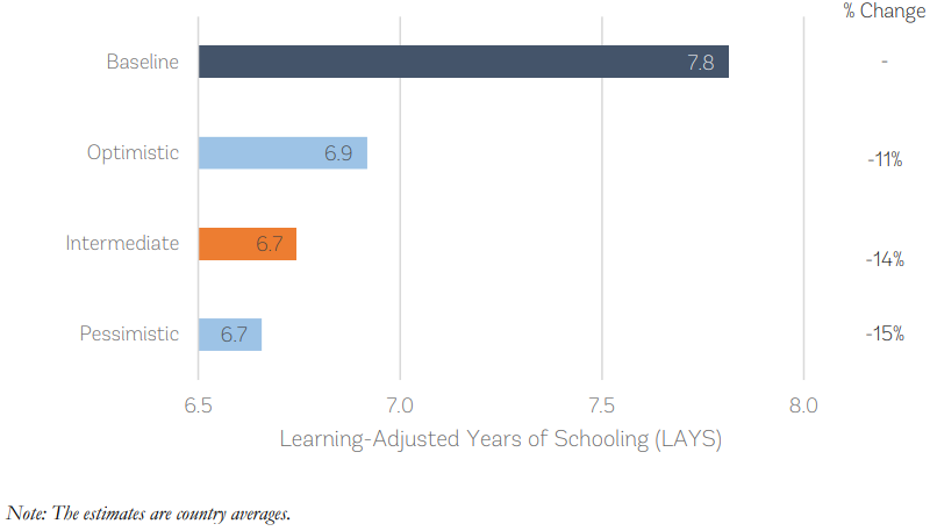 School closures due to COVID-19 could reduce the country average learning that students achieve during their lifetime from 7.8 to 6.7 Learning Adjusted Years, a drop of 1.1 years. Photo: Chau Doan / World Bank
School closures due to COVID-19 could reduce the country average learning that students achieve during their lifetime from 7.8 to 6.7 Learning Adjusted Years, a drop of 1.1 years. Photo: Chau Doan / World Bank
This blog is a biweekly feature highlighting recent working papers from around the World Bank Group that were published in the World Bank’s Policy Research Working Paper Series. This entry introduces four papers published from October 16 to October 31 on various topics, including trade, COVID-19, education, and public spending .
The first two papers we introduce examine the benefits of trade. In Trade Agreements in South Asia : Towards a Successful Story in the Developing World, Sebastian Franco-Bedoya, quantifies the trade creation effects of South Asia’s trade agreements within the region and with the rest of the world. In Is International Trade Always Beneficial to Labor Markets? A Case Study from Egypt, Mexico Vergara and coauthors evaluates the relationship between regional trade agreements to test whether rising imports have impacted wages, informality, and female labor force participation in Egypt.
-
Trade Agreements in South Asia : Towards a Successful Story in the Developing World uses an extensive database of bilateral trade covering the manufacturing, agriculture, and service sectors in 190 countries over 1990–2015 to quantify the trade creation effects of South Asia’s trade agreements within the region and with the rest of the world. The paper’s main finding is that these effects are in general stronger for trade agreements signed by South Asian countries and even stronger in the case of intraregional agreements. The effects of free trade agreements vary substantially among countries and sectors and between final and intermediate goods. The paper shows that the trade policy implemented in South Asia in the previous decades has been successful but results also missed opportunities for the region .
-
Is International Trade Always Beneficial to Labor Markets? A Case Study from Egypt tests whether imports explain the disappointing Egyptian labor market performance. The authors evaluate the relationship between regional trade agreements using a gravity model and import flows to test whether rising imports have impacted wages, informality, and female labor force participation. The results suggest that imports are not to blame for disappointing labor market outcomes in Egypt. Figure 1 below shows that regions with a higher number of exporting firms (Panel A) are also the regions with major employment concentration (Panel B)
Figure 1. Employment is concentrated in the regions with a major number of firms connected to international trade
The next two papers we introduce explore topics related to the COVID-19 pandemic. In Learning Losses during COVID-19: Global Estimates of an Invisible and Unequal Crisis, João Pedro Azevedo and coauthors present updated simulation results of the potential effects of COVID-19-related school closures on learning outcomes globally. In Electoral Cycles and Public Spending during the Pandemic, Michael Lokshin and coauthors use a newly assembled data set on various types of social protection spending in 154 countries during the COVID-19 pandemic in 2020 and 2021 to analyze the effect of the electoral cycle on the size and composition of the social protection stimulus budget.
-
Learning Losses during COVID-19: Global Estimates of an Invisible and Unequal Crisis finds that the overall learning levels are likely to fall substantially around the world. Under an intermediate scenario, school closures could potentially increase the share of children in Learning Poverty in low- and middle-income countries by 13 percentage points, to 70 percent. Globally, learning adjusted years of schooling could fall by 1.1 years, and the share of youth below minimum proficiency on the Program for International Student Assessment could rise by 12.3 percentage points. Furthermore, school shutdowns could generate lifetime earning losses of $21 trillion. Figure 2 below shows that under an intermediate scenario, school closures due to COVID-19 could reduce the country average learning that students achieve during their lifetime from 7.8 to 6.7 Learning Adjusted Years, a drop of 1.1 years .
Figure 2. Results of simulation: Effect on Learning Adjusted Years of Schooling (LAYS)

-
Electoral Cycles and Public Spending during the Pandemic uses two new data sets on the detailed expenditures on social protection in the pandemic stimulus packages and the timing of electoral cycles to test the presence of politically motivated cycles in the composition and size of pandemic stimulus budgets. In particular, the paper assesses whether the period of the electoral cycle in which a country was at the beginning of the pandemic affected its social protection response to the pandemic. Results show the longer the time since the last election in a country—and thus the sooner the next election date—the larger the share of the social protection pandemic budget allocated to social assistance and income protection and the lower the share allocated to job retention schemes. In contrast, the electoral cycle has no impact on the overall size of the budget allocated to social assistance, except in countries with high political competition.




Join the Conversation